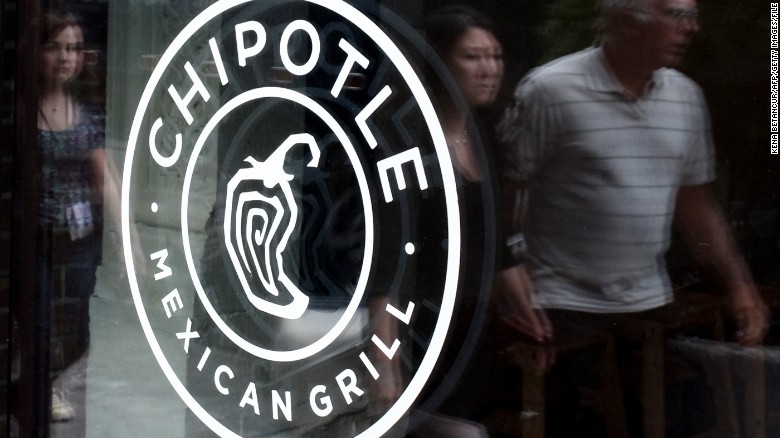Chipotle has temporarily closed dozens of its restaurants in Washington and Oregon out of an abundance of caution after an E. coli scare, and one of the people sickened in the outbreak has filed a lawsuit against the restaurant chain.
No one has died in the reported cases of infection, the Washington State Department of Health said. Seven of the Washington patients and three Oregon patients were hospitalized.
Chris Collins of Portland, Oregon, went to an urgent care center two days after eating at a Chipotle restaurant. “I’ve never gotten sick like this,” he told CNN affiliate KATU. “The excruciating pain in my abdomen was something I’ve never experienced. It feels like your guts are being ripped out.”
The urgent care center sent him to a hospital emergency room.
A lawsuit was filed in federal court Monday in connection with the outbreak. Charmaine Denise Mode, a pharmacist from Kelso, Washington, ate at a Chipotle restaurant in Vancouver, Washington, on October 21 and started feeling nauseated four days later with “severe diarrhea,” according to the lawsuit against Chipotle.
“The next day, the diarrhea became bloody and far more intense,” the suit said. She went to the hospital, where she “endured a painful rectal examination,” said the suit.
The next day, local health officials linked her case to the Chipotle outbreak, according to the suit, which seeks damages of at least $75,000.
Chipotle was not immediately available for comment on the lawsuit.
Contamination source still undetermined
The source of contamination has yet to be exactly determined, the department said, but 23 of the 25 cases in Washington and 12 cases in Oregon have been linked to a handful of locations of the Mexican-themed restaurant chain. Chipotle is working with health departments and federal agencies such as the Centers for Disease Control and Prevention and the Food and Drug Administration to help determine the cause of the cases.
Although cases are being investigated in eight locations in Oregon and Washington state, Chipotle has temporarily closed 43 stores.
“We immediately closed all of our restaurants in the area out of an abundance of caution, even though the vast majority of these restaurants have no reported problems,” said Chipotle spokesman Chris Arnold in a statement.
The chain said it has conducted additional deep cleaning and full sanitizing of its restaurants in the area. Chipotle also said the restaurants are being tested, as are the food and distribution centers, by the company and the health departments. The company has also retained two food safety consulting firms to improve the company’s food safety.
On Tuesday, Dr. Tom Frieden, director of the CDC, said the closing down the Chipotle locations was the right thing to do. “[It’s] always better to take broad action than narrow it down,” he said. “From what we understand so far, they are being very responsible in their actions in response to the cases that have been reported. ”
No exact source has yet been identified in this outbreak, but Dr. Kathleen Gensheimer, the FDA’s chief medical officer and director of outbreak response, said Chipotle “is sharing all of their records with us, working with us in any way possible to give us information.”
Dr. Jeff Duchin, a health officer in King County in Washington, said that these investigations are “really hard” to do since there is overlap in the ingredients used in the different menu items and hopes the environmental testing can pinpoint the specific item causing the outbreak. A number of produce items and a few spices have been sent to the lab for testing.
This year, Chipotle has also experienced a salmonella outbreak associated with tomatoes, as well a Norovirus outbreak associated with one of its stores.
“We have seen them associated with clusters this past year, and when the smoke dies down, Chipotle has said they are interested in coming to FDA to discuss what practices might be contributing to these events,” Gensheimer said.
More than 20 outbreaks since 2007
Infections with Escherichia coli can cause severe stomach cramps, vomiting and diarrhea which is often bloody. Fever is usually low, if at all present, according to the CDC. Infections can range from mild to life-threatening.
E. coli bacteria are commonly found in human and animal intestines and are a key component of healthy digestion. Most strains are harmless but some are not, according to the CDC. “Infections start … when you get tiny (usually invisible) amounts of human or animal feces in your mouth,” it says.
This happens surprisingly often, the CDC says, and many times no infection results.
Common sources of infection are human and animal contact in the farming industry. In April, at least 25 people became ill with E. coli infections after visiting a dairy fair in Washington state.
But harmful E. coli can also make their way into food ingredients. Food handlers carrying harmful E. coli can pass the bacteria on by not thoroughly washing their hands before performing their work.
The CDC has investigated more than 20 major E. coli outbreaks since 2007. Other common foodborne ailments are caused by listeria and salmonella bacteria.



